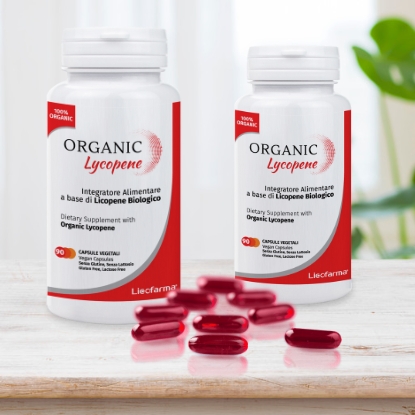The attention to lycopene as a nutraceutical active ingredient useful for the protection of vision and eye health in general, is linked to two main functions of this carotenoid: antioxidant and antiangiogenesis. In particular, the latter property seems to be very relevant in the prevention of certain degenerative eye diseases.
Angiogenesis is the physiological process of formation of new blood vessels from existing ones, which is essential for many functions of the body. When, however, this physiological mechanism is not naturally regulated by the body, it is defined as pathological and can be the cause of certain diseases. At the ocular level, the main conditions related to angiogenesis are age-related macular degeneration (AMD) and proliferative diabetic retinopathy.
Lycopene and Age-Related Macular Degeneration
 Macular Degeneration is a degenerative disease whose onset depends on the combination of several factors, both genetic and environmental, including age, family history, arterial hypertension, smoking or excessive exposure to light, oxidative stress. There are two forms of AMD, both associated with alterations in the capillary microcirculation: the dry form, also known as atrophic, and the wet or exudative form.
Macular Degeneration is a degenerative disease whose onset depends on the combination of several factors, both genetic and environmental, including age, family history, arterial hypertension, smoking or excessive exposure to light, oxidative stress. There are two forms of AMD, both associated with alterations in the capillary microcirculation: the dry form, also known as atrophic, and the wet or exudative form.
The first is generally considered incurable, although with a correct lifestyle and dietary supplementation of antioxidants, in particular zeaxanthin, astaxanthin and lycopene, it is possible in some cases to slow down the progression. The wet form is the most serious for which there are specific treatments based on anti-VEGF (vascular growth factor) drugs.
The Role of Lycopene
Studies have shown that lycopene, in addition to its well-known antioxidant action, also has a marked anti-angiogenic activity.
In particular, it has been shown that lycopene reduces in vitro, in a dose-dependent manner, the proliferation of endothelial cells, their migration and the formation of new capillaries. In addition, other studies have revealed that in patients with AMD, lycopene levels are lower and it has also been observed that there is an inverse correlation between plasma levels of carotenoids and the presence of this serious eye disease. Specifically, lycopene, thanks to its angiogenic activity, was found to be the only carotenoid that has been shown in different studies to protect ocular health, helping to reduce the risk of age-related macular degeneration.
Bibliography
- Vasapollo G., Rescio L., Angiogenesi: ruolo fisiologico e alterazione patologica a livello oculare. Nutrition4Health, N.7, 2018
- Cazzolla P., Di Maio A., Rescio L., Licopene Bio, Scripta Manent Edizioni, 2013
- Prokofyeva E, Zrenner E. Epidemiology of major eye diseases leading to blindness in Europe: a literature review. Ophthalmic Res 2012; 47:171-88.
- Sahin M, Sahin E, Gümüşlü S. Effects of lycopene and apigenin on human umbilical vein endothelial cells in vitro under angiogenic stimulation. Acta Histochem 2012; 114:94-100.
- Elgass S, Cooper A, Chopra M. Lycopene inhibits angiogenesis in human umbilical vein endothelial cells and rat aortic rings. Br J Nutr 2012; 108:431-9.
- Mares-Perlman JA, Brady WE, Klein R, et al. Serum antioxidants and age-related macular degeneration in a population-based case-control study. Arch Ophthalmol 1995; 113:1518-23.
Disclaimer:
The information on this site is for informational purposes only and is not intended in any way to replace the advice of your doctor or specialist. With reference to the products recommended on the site, it is recommended to always seek the advice of your doctor or specialist before use. In no event shall the owner of the site be liable for any damages resulting from the misuse by the user of the content and information published on the site.





